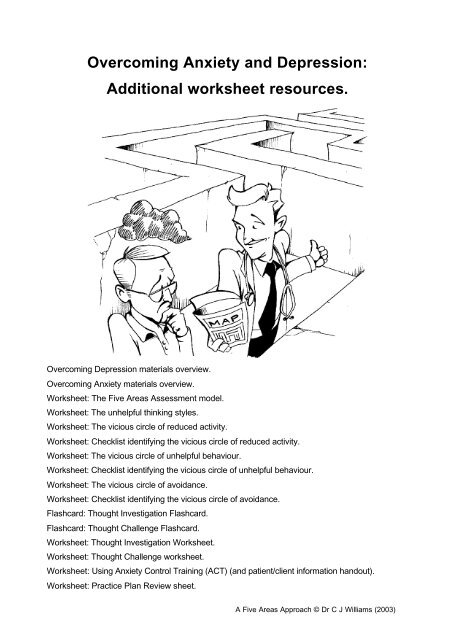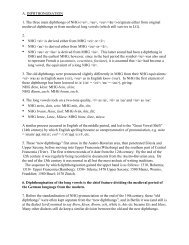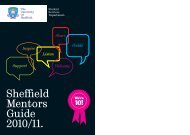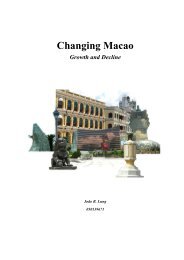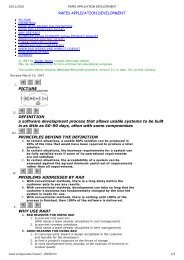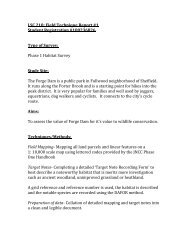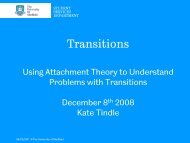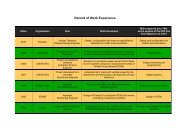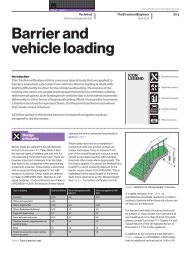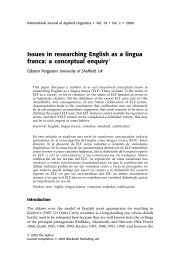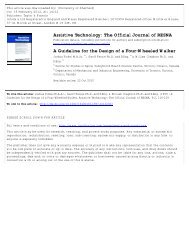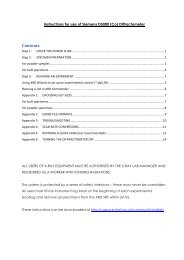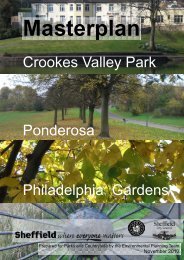Overcoming Anxiety and Depression: Additional worksheet resources.
Overcoming Anxiety and Depression: Additional worksheet resources.
Overcoming Anxiety and Depression: Additional worksheet resources.
You also want an ePaper? Increase the reach of your titles
YUMPU automatically turns print PDFs into web optimized ePapers that Google loves.
<strong>Overcoming</strong> <strong>Anxiety</strong> <strong>and</strong> <strong>Depression</strong>:<br />
<strong>Additional</strong> <strong>worksheet</strong> <strong>resources</strong>.<br />
<strong>Overcoming</strong> <strong>Depression</strong> materials overview.<br />
<strong>Overcoming</strong> <strong>Anxiety</strong> materials overview.<br />
Worksheet: The Five Areas Assessment model.<br />
Worksheet: The unhelpful thinking styles.<br />
Worksheet: The vicious circle of reduced activity.<br />
Worksheet: Checklist identifying the vicious circle of reduced activity.<br />
Worksheet: The vicious circle of unhelpful behaviour.<br />
Worksheet: Checklist identifying the vicious circle of unhelpful behaviour.<br />
Worksheet: The vicious circle of avoidance.<br />
Worksheet: Checklist identifying the vicious circle of avoidance.<br />
Flashcard: Thought Investigation Flashcard.<br />
Flashcard: Thought Challenge Flashcard.<br />
Worksheet: Thought Investigation Worksheet.<br />
Worksheet: Thought Challenge <strong>worksheet</strong>.<br />
Worksheet: Using <strong>Anxiety</strong> Control Training (ACT) (<strong>and</strong> patient/client information h<strong>and</strong>out).<br />
Worksheet: Practice Plan Review sheet.<br />
A Five Areas Approach © Dr C J Williams (2003)
Area 1: Situation,<br />
relationship <strong>and</strong><br />
practical problems.<br />
Workbooks:<br />
2. Practical Problem<br />
solving.<br />
3. Being Assertive.<br />
<strong>Overcoming</strong> <strong>Depression</strong> Materials overview<br />
Area 2:<br />
Altered thinking.<br />
Workbooks:<br />
4. Noticing extreme<br />
<strong>and</strong> unhelpful<br />
thinking.<br />
5. Changing extreme<br />
<strong>and</strong> unhelpful<br />
thinking.<br />
Workbook 1.<br />
Underst<strong>and</strong>ing<br />
depression.<br />
Area 3:<br />
Altered behaviour.<br />
Workbooks:<br />
Changing altered<br />
behaviours:<br />
6. Reduced activity.<br />
7. Unhelpful<br />
behaviours.<br />
Area 5: Altered Mood.<br />
<strong>Overcoming</strong> <strong>Depression</strong><br />
Workbook 10:<br />
Planning for the<br />
future.<br />
Area 4:<br />
Altered physical<br />
feelings/symptoms.<br />
Workbooks:<br />
8. <strong>Overcoming</strong> Sleep<br />
<strong>and</strong> other problems.<br />
9. Underst<strong>and</strong>ing <strong>and</strong><br />
using antidepressant<br />
medication.<br />
A Five Areas Approach © Dr C J Williams (2003)
Underst<strong>and</strong>ing<br />
worry <strong>and</strong><br />
generalised<br />
anxiety.<br />
Area 1: Situation,<br />
relationship <strong>and</strong><br />
practical problems.<br />
Workbooks:<br />
2. Practical Problem<br />
solving.<br />
3. Being Assertive.<br />
<strong>Overcoming</strong> <strong>Anxiety</strong> Materials Overview.<br />
Underst<strong>and</strong>ing<br />
panic <strong>and</strong><br />
phobias.<br />
Area 2:<br />
Altered thinking.<br />
Workbooks:<br />
4. Noticing extreme<br />
<strong>and</strong> unhelpful<br />
thinking.<br />
5. Changing extreme<br />
<strong>and</strong> unhelpful<br />
thinking.<br />
Workbook 1.<br />
Underst<strong>and</strong>ing how<br />
anxiety is affecting me?<br />
Area 3:<br />
Altered behaviour.<br />
Area 5: Altered Mood.<br />
Workbook 10:<br />
Planning for the<br />
future.<br />
Underst<strong>and</strong>ing<br />
obsessivecompulsive<br />
symptoms.<br />
Identify targets for change<br />
Workbooks:<br />
Changing altered<br />
behaviours:<br />
6. <strong>Overcoming</strong><br />
Avoidance.<br />
7. <strong>Overcoming</strong><br />
Unhelpful behaviours.<br />
Underst<strong>and</strong>ing<br />
how we respond<br />
to physical health<br />
problems.<br />
Area 4:<br />
Altered physical<br />
feelings/symptoms.<br />
Workbooks:<br />
8. <strong>Overcoming</strong> Sleep<br />
problems.<br />
9. Underst<strong>and</strong>ing <strong>and</strong><br />
using anti-anxiety<br />
medication.<br />
A Five Areas Approach © Dr C J Williams (2003)
The Five Areas Assessment model<br />
Life situation/relationships<br />
<strong>and</strong> practical problems<br />
Altered thinking<br />
Altered feelings Altered physical<br />
Altered behaviour<br />
symptoms<br />
A Five Areas Approach © Dr C J Williams (2003)
The unhelpful thinking styles.<br />
Unhelpful thinking style Typical thoughts<br />
1. Bias against myself.<br />
2. Putting a negative slant on<br />
things that have happened<br />
(Negative mental filter).<br />
3. Having a gloomy view of the<br />
future.<br />
(Make negative predictions).<br />
4. Jumping to the worst<br />
conclusion – catastrophising.<br />
5. Second guessing that others<br />
think badly of me without<br />
actually checking if this is true.<br />
(Mind-reading).<br />
6. Bearing all responsibility/taking<br />
all the blame.<br />
7. Making extreme<br />
statements/setting impossible<br />
st<strong>and</strong>ards.<br />
I overlook my strengths.<br />
I focus on my weaknesses.<br />
I downplay my achievements.<br />
I am my own worst critic.<br />
I see things through dark tinted<br />
glasses.<br />
I tend to focus on the bad in<br />
situations.<br />
I make negative predictions about<br />
the future.<br />
Predicting that the very worst will<br />
happen.<br />
I mind-read what others think of me.<br />
I often think that others don’t like me.<br />
I feel responsible for whether<br />
everyone else has a good time.<br />
I take the blame if things go wrong.<br />
I take things personally/to heart.<br />
I take unfair responsibility for things<br />
that are not my fault.<br />
I use the words “always”, “never”<br />
<strong>and</strong> “typical” a lot to summarise<br />
things.<br />
I make “must”, “should”, “ought” or<br />
“got to” statements to myself.<br />
Overall, am I showing extreme <strong>and</strong> unhelpful thinking? Yes No<br />
Tick here if you<br />
have this<br />
thinking style<br />
A Five Areas Approach © Dr C J Williams (2003)
Worsen how I feel<br />
The vicious circle of reduced activity<br />
Feel low/down in my mood/ill<br />
Reduced activity of things that lead to<br />
fun/pleasure/sense of achievement<br />
Reduced total activity<br />
A Five Areas Approach © Dr C J Williams (2003)
Checklist: Identifying the vicious circle of reduced activity.<br />
As a result of how I feel am I: Tick here if you have<br />
Going out or socialising less?<br />
Paying less attention to my self-care or personal hygiene (e.g.<br />
washing less, less bothered about my appearance, leaving<br />
clothes on for longer, not shaving or combing my hair)?<br />
Eating poorly (e.g. eating less or tending to eat more “junk” food,<br />
or food that takes little preparation)?<br />
Stopping or reducing doing hobbies/interests such as reading or<br />
other things I previously enjoyed or did to relax?<br />
Failing to keep up with housework (e.g. am I “letting things go”<br />
around the house)?<br />
Not always answering the phone or the door when people visit?<br />
Leaving letters/bills unopened or not replying to them because of<br />
a lack of energy or interest in actively dealing with them.<br />
Less interested in sex (e.g. pushing my partner away physically<br />
because of a lack of enjoyment/energy for sex)?<br />
Staying inactive or lying in bed so that I am far less physically<br />
active than before.<br />
Q. Have I reduced or stopped doing any other things?<br />
Write them in here:<br />
✎<br />
noticed this.<br />
Having completed these questions, reflect on your answers using the three questions<br />
below:<br />
1. Have I reduced or stopped doing things? Yes No<br />
2. Has this reduced my sense of pleasure/achievement in things? Yes No<br />
3. Overall, has this worsened how I feel? Yes No<br />
If you have answered Yes to all three questions, you are experiencing the vicious circle of<br />
reduced activity.<br />
A Five Areas Approach © Dr C J Williams (2003)
The vicious circle of unhelpful behaviour<br />
Feel low or anxious<br />
in my mood<br />
(or other problems/<br />
illness, emotions)<br />
Worsen how I feel Unhelpful behaviour<br />
Create or worsen problems<br />
A Five Areas Approach © Dr C J Williams (2003)
Checklist: Identifying the vicious circle of unhelpful behaviour.<br />
As a result of how I feel, am I: Tick here if you<br />
have noticed<br />
this.<br />
Misusing drink/illegal drugs or prescribed medication to block how I feel in<br />
general or improve how I sleep etc.?<br />
Eating too much to block how I feel (“comfort eating”), or over-eating so much<br />
that this becomes a “binge”?<br />
Trying to spend my way out of how I feel by going shopping (“retail therapy”)?<br />
Becoming very dem<strong>and</strong>ing or excessively seeking reassurance from others?<br />
Looking to others to make decisions or sort out problems for me?<br />
Throwing myself into doing things so there are no opportunities to stop, think<br />
<strong>and</strong> reflect?<br />
Pushing others away <strong>and</strong> being verbally or physically threatening/rude to<br />
them?<br />
Deliberately harming myself in an attempt to block how I feel?<br />
Taking part in risk-taking actions for example crossing the road without<br />
looking, or gambling using money I don’t really have?<br />
Compulsively checking, cleaning, or doing things a set number of times or in<br />
exactly the “correct” order so as to make things “right”?<br />
Carrying out mental rituals such as counting or deliberately thinking “good”<br />
thoughts/saying prayers to make things feel “right”?<br />
Being overly aware <strong>and</strong> excessive checking for symptoms of ill health?<br />
Excessively changing the way I sit or walk to reduce symptoms of physical<br />
discomfort? The altered posture then creates or worsens the physical<br />
problem.<br />
Sleeping with a number of people as a means of blocking how I feel or to feel<br />
needed, attractive or relaxed?<br />
Unhelpful behaviours leading to subtle avoidance of anxiety-provoking<br />
situations. Am I:<br />
Quickly leaving anxiety-provoking situations?<br />
Rushing though a task as quickly as possible? (E.g. walking or talking faster).<br />
Trying very hard not to think about upsetting thoughts/memories? Trying to<br />
distract myself to improve how I feel?<br />
Only going out <strong>and</strong> doing things when others are there to help?<br />
Misusing drink/illegal drugs or prescribed medication to block how I feel in<br />
anxious situations?<br />
Taking the easiest option (for example joining the shortest queue in the shop<br />
as a result of anxiety, or turning down opportunities that seem scary)?<br />
Deliberately looking away during conversations <strong>and</strong> avoiding eye contact?<br />
Bringing conversations to a close quickly because of not knowing what to<br />
say?<br />
Q. Am I avoiding things in other subtle ways?<br />
Write in what you are doing here if this applies to you.<br />
✎<br />
Having completed these questions, reflect on your answers using the three questions below:<br />
1). Am I doing certain activities or behaviours that are designed to improve how I feel?<br />
Yes No<br />
2). Are some of these activities unhelpful in the short or longer-term either for me or for others?<br />
Yes No<br />
3). Overall has this worsened how I feel? Yes No<br />
If you have answered Yes to all three questions, you are experiencing the vicious circle of<br />
unhelpful behaviour.<br />
A Five Areas Approach © Dr C J Williams (2003)
Worsen how I feel.<br />
The vicious circle of avoidance.<br />
<strong>Anxiety</strong>.<br />
Create or worsen problems.<br />
Avoidance <strong>and</strong> an increasingly restricted<br />
life <strong>and</strong> undermined confidence.<br />
Avoidance<br />
Avoid any situations that seem to<br />
worsen the anxiety.<br />
A Five Areas Approach © Dr C J Williams (2003)
Checklist: Identifying the vicious circle of avoidance.<br />
As a result of feeling anxious am I: Tick here if you<br />
have noticed<br />
this.<br />
Avoiding dealing with important practical problems (both large <strong>and</strong> small)?<br />
Not really being honest with others. For example saying yes when I really<br />
mean no?<br />
Trying hard to avoid situations that bring about upsetting thoughts/memories?<br />
Brooding over things <strong>and</strong> therefore not longer living life to the full?<br />
Avoiding opening or replying to letters or bills?<br />
Sleeping in to avoid doing things or meeting people?<br />
Avoiding answering the phone, or the door when people visit?<br />
Avoiding sex?<br />
Avoiding talking to others face to face?<br />
Avoiding being with others in crowded or hot places?<br />
Avoiding busy or large shops, or finding that I have to think about where <strong>and</strong><br />
when I go shopping etc.?<br />
Avoiding going on buses, in cars, taxis etc., or any places where it is difficult to<br />
escape?<br />
Avoiding walking alone far from home?<br />
Avoiding situations, objects, places or people because of fears about what harm<br />
might result?<br />
Avoiding physical activity or exercise as a result of concerns about my physical<br />
health?<br />
Q. Am I avoiding things in other ways?<br />
Write in here how you are doing this if this is applicable to you.<br />
✎<br />
Having completed these questions, reflect on your answers using the three questions below:<br />
1). Am I avoiding doing things as a result of anxiety? Yes No<br />
2). Has this reduced my confidence in things <strong>and</strong> led to an increasingly restricted life?<br />
Yes No<br />
3). Overall, has this worsened how I feel? Yes No<br />
If you have answered Yes to all three questions, you are experiencing the vicious circle of<br />
avoidance.<br />
A Five Areas Approach © Dr C J Williams (2003)
THOUGHT INVESTIGATION FLASHCARD.<br />
Carry these questions about with you <strong>and</strong> use them during the day to help you to identify any<br />
unhelpful thinking styles.<br />
1). Become aware of your thinking whenever you notice your mood change.<br />
E.g. at times when you become more anxious, low or sad, guilty, angry or irritable, ashamed etc.<br />
Ask yourself “what is going through my mind right now?” This might include thoughts about:<br />
• How others see you.<br />
• The events/situations that have just happened.<br />
• What might happen in the future.<br />
• How you see your own body, behaviour or performance.<br />
Remember, thoughts can include memories from the past or mental images.<br />
2). Next, try to work out if you have any extreme <strong>and</strong> unhelpful thoughts. These thoughts<br />
show one of the unhelpful thinking styles.<br />
Useful questions to identify the unhelpful thinking styles.<br />
• Am I being my own worst critic? (bias against yourself)<br />
• Am I focusing on the bad in situations? (a negative mental filter)<br />
• Am I making negative predictions about the future? (a gloomy view of the future)<br />
• Am I jumping to the very worst conclusion? (jumping to the worst conclusion)<br />
• Am I second-guessing that others see me badly without actually checking if it’s actually<br />
true? (mind-reading)<br />
• Am I taking unfair responsibility for things that aren’t really my fault/taking all the blame?<br />
• Am I using unhelpful must/should/ought/got to statements? (making extreme statements or<br />
setting impossible st<strong>and</strong>ards)?<br />
3). Ask yourself:<br />
Q. What is the consequence of believing the thought – does it worsen how I feel <strong>and</strong> unhelpfully<br />
alter what I do?<br />
If you answer Yes, you have identified an extreme <strong>and</strong> unhelpful thought. This is the sort of<br />
thought you can challenge using the Thought Challenge Flashcard in workbook 5.<br />
A Five Areas Approach © Dr C J Williams (2003)
THOUGHT CHALLENGE FLASHCARD.<br />
Useful questions to challenge extreme <strong>and</strong> unhelpful thoughts.<br />
1). Does the thought show one of the unhelpful thinking styles?<br />
What is the consequence of believing this thought – on how I feel <strong>and</strong> what I do?<br />
2). What is the evidence for <strong>and</strong> against the thought?<br />
a). First think about why you believe the thought.<br />
b). The next step is to identify <strong>and</strong> write down all the reasons against the thought being<br />
true. The following list of questions can help you with this task.<br />
• Is there anything to make me think the thought is incorrect?<br />
• Are there any other ways of explaining the situation that are more accurate?<br />
• If I wasn’t feeling like this what would I say?<br />
• Would I tell a friend who believed the same thought that they were wrong? Do I<br />
apply one set of st<strong>and</strong>ards to myself <strong>and</strong> another to others?<br />
• What would other people say? Have I heard different opinions from others about the<br />
same thought?<br />
3). Create an alternative balanced <strong>and</strong> helpful thought.<br />
Use your answers to the questions to try to come up with an alternative thought that is<br />
more balanced <strong>and</strong> helpful. Try to find a conclusion that you can believe.<br />
Try to act on the new balanced thought.<br />
Act against the old extreme <strong>and</strong> unhelpful thoughts. This will help undermine them.<br />
By doing this you will build your confidence in using the approach.<br />
A Five Areas Approach © Dr C J Williams (2003)
Thought Investigation Worksheet: Identifying extreme <strong>and</strong> unhelpful thinking.<br />
1. Situation/ relationship or<br />
practical problem when<br />
your mood altered.<br />
Think in detail:<br />
Where am I, what am I<br />
doing? Consider:<br />
• The time: What time of<br />
day is it?<br />
• The place: Where am<br />
I?<br />
• The people: Who is<br />
present? Who am I<br />
with?<br />
• The events: What has<br />
been said/What events<br />
happened?<br />
Situation:<br />
2. Altered emotional <strong>and</strong><br />
physical feelings<br />
At that time, am I<br />
• Low or sad? Guilty?<br />
• Worried, tense, anxious or<br />
panicky?<br />
• Angry or irritable?<br />
• Ashamed?<br />
a. State the feelings clearly.<br />
Try to be as precise as<br />
possible.<br />
If more than one feeling<br />
occurs, underline the most<br />
powerful feeling.<br />
b. How powerful is this<br />
feeling? (0-100%)<br />
c. Note down any strong<br />
physical sensations you notice.<br />
a. My feelings:<br />
b. Powerfulness:<br />
0-100%=<br />
c. Physical sensations:<br />
3. What thoughts are present at the<br />
time?<br />
What is going through my mind?<br />
How do I see:<br />
• Myself, How others see me?<br />
• The current events/situation?<br />
• What might happen in the<br />
future?<br />
• My own body, behaviour or<br />
performance?<br />
• Any memories or images?<br />
a. State the thought (s) clearly. Try<br />
to be as precise as possible.<br />
If more than one thought occurs,<br />
underline the most powerful<br />
thought.<br />
b. Rate how strongly you believe<br />
the most powerful thought at the<br />
time (0-100%).<br />
My immediate thought (s):<br />
a. ✎ State the thought (s) clearly.<br />
If you have noticed more than one<br />
thought, Underline the most<br />
powerful thought<br />
b. ✎ Rate your belief in the most<br />
powerful thought at the time.<br />
0% 100%<br />
I-------------------------------I<br />
4. What unhelpful thinking style(s)<br />
occur?<br />
1. Bias against myself.<br />
2. Putting a negative slant on<br />
things (negative mental filter).<br />
3. Having a gloomy view of the<br />
future (making negative<br />
predictions)<br />
4. Jumping to the worst conclusion<br />
(catastrophic thinking).<br />
5 Second guessing how others see<br />
me (mind-reading).<br />
6. Bearing all responsibility/taking<br />
all the blame.<br />
7. Making extreme statements/rules<br />
e.g. using must, should, ought,<br />
always, <strong>and</strong> never statements.<br />
If any of the styles are present, you<br />
have identified an extreme thought.<br />
Which thinking styles are<br />
present?<br />
(please state numbers or types)<br />
✎ No (s):<br />
5. Impact of the immediate<br />
thought(s)<br />
a. What did I do differently?<br />
Consider any:<br />
• Reduced activity.<br />
• Avoided people, places or<br />
situations.<br />
• Unhelpful behaviours.<br />
b. What was the impact on:<br />
• Myself?<br />
• My view of others?<br />
• How I felt?<br />
• What I said?<br />
• What I did?<br />
Overall, was the impact helpful<br />
or unhelpful?<br />
If there is an unhelpful impact,<br />
you have identified an unhelpful<br />
thought.<br />
a. What did I do differently?<br />
b. Overall, is it helpful or<br />
unhelpful for me to believe the<br />
thought?<br />
Helpful €<br />
Unhelpful €<br />
A Five Areas Approach © Dr C J Williams (2003)
Thought Challenge Worksheet: Choose one thought to challenge at a time.<br />
Reasons supporting the<br />
immediate thought<br />
List all the reasons why I<br />
believed the immediate thought<br />
at the time.<br />
My evidence supporting the<br />
immediate thought.<br />
(Write in)<br />
✎<br />
Evidence against the immediate<br />
thought.<br />
• Is there anything to make me think<br />
the thought is incorrect?<br />
• Are there any other ways of<br />
explaining the situation that are<br />
more accurate?<br />
• If I wasn’t feeling like this, what<br />
would I say?<br />
• Would I tell a friend who believed<br />
the same thought that they were<br />
wrong?<br />
What would other people say?<br />
• Have I heard different opinions from<br />
others about the thought?<br />
My evidence against the immediate<br />
thought.<br />
(Write in)<br />
✎<br />
Come to a balanced conclusion. My plan for putting the balanced<br />
Use the answers from the first two columns<br />
to try to come up with a balanced <strong>and</strong><br />
helpful conclusion.<br />
Create a balanced conclusion that you can<br />
believe. This should be based on all the<br />
information you have available to you <strong>and</strong><br />
bear in mind the reasons for <strong>and</strong> against<br />
believing the immediate thought.<br />
My balanced conclusion.<br />
(Write in)<br />
✎<br />
a). Rating of my belief in the balanced<br />
conclusion.<br />
0% 100%<br />
I-------------------------------I<br />
b). Re-rate my belief in the immediate<br />
thought.<br />
0% 100%<br />
I--------------------------I<br />
conclusion into practice.<br />
• How can I change what I do to<br />
reinforce my balanced conclusion?<br />
• How can I undermine my original<br />
extreme <strong>and</strong> unhelpful thought by acting<br />
against it?<br />
My plan to put the balanced conclusion into<br />
practice.<br />
(Write in)<br />
✎<br />
My plan to undermine my original extreme<br />
<strong>and</strong> unhelpful thought.<br />
(write in)<br />
✎<br />
A Five Areas Approach © Dr C J Williams (2003)
Using <strong>Anxiety</strong> Control Training (ACT).<br />
Dr Chris Williams, University of Glasgow.<br />
<strong>Anxiety</strong> Control Training (ACT) is a self-help relaxation method that was designed by Dr Philip Snaith<br />
at the University of Leeds to enable people to learn mastery over anxiety. <strong>Anxiety</strong> is a condition that is<br />
very common <strong>and</strong> few people allow themselves the time to begin to overcome it. The approach will<br />
only work if the person wishes to learn the skill of controlling anxiety <strong>and</strong> is prepared to work at it<br />
steadily <strong>and</strong> regularly over several weeks. There are no shortcuts to learning this new skill <strong>and</strong> it is<br />
therefore very important that you make up your mind whether you want to apply yourself to learning to<br />
control your anxiety since it is ultimately only through your own efforts that improvement will occur. If<br />
you do decide that you want to learn this skill, please let your health care practitioner know so that he<br />
or she can show you how to get started. You will be shown a method of achieving a state of calm<br />
relaxation simply by concentrating your mind on relaxing thoughts rather than unhelpful, fearful<br />
thoughts. You would normally be taught this within individual sessions <strong>and</strong> in addition the approach is<br />
recorded on a tape for you to use at home. Alternatively, this can be provided as an MP3 file if you<br />
have an MP3 (computer file) player.<br />
The key to the approach is to help you to relax the tension in your body <strong>and</strong> move your thoughts<br />
away from the worrying thoughts that dominate your thinking. It normally takes a few sessions to<br />
begin to learn the skills of experiencing this deep calm. To do this you will need to practice this<br />
regularly, twice a day. Try to view the tape as a prescription to be taken in the morning <strong>and</strong><br />
evening. Sessions should not be too long - just 10 minutes - but you will need to find a room where<br />
you can be on your own <strong>and</strong> not be interrupted by others. If this is difficult it is important to ask<br />
yourself whether you are just too busy to relax <strong>and</strong> if so what changes you need to make in your<br />
life to change this.<br />
You may find as you begin to practice the <strong>Anxiety</strong> Control Training that your thoughts begin to w<strong>and</strong>er<br />
as you listen through the session. It is quite normal to find it is hard to do this at first, but with practice<br />
<strong>and</strong> further sessions you will find it easier <strong>and</strong> easier to clear your mind <strong>and</strong> reach a state of<br />
calmness. Over six to eight weeks you will slowly be able to stop having to use the tape so that you<br />
yourself can induce a state of calm in everyday life. As with a good holiday, the benefits of this last far<br />
longer than just the time taken during the session of relaxation <strong>and</strong> will have additional benefits for you<br />
throughout the day.<br />
There are two main parts to the treatment approach:<br />
1. In the first two or three sessions you will be shown how to let calm feelings replace anxious<br />
feelings during the session.<br />
2. After this you will move on to the second form of <strong>Anxiety</strong> Control Training where you begin to<br />
think about slightly stressful events <strong>and</strong> then learn to control the anxiety this causes.<br />
You will slowly begin to control unnecessary anxiety in real life situations in order to reach a state of<br />
calmness. With further practice, your mastery over anxiety will improve <strong>and</strong> you will begin to find<br />
yourself coping with situations that previously you dreaded.<br />
The really good thing about anxiety control training is that you do it, not your health care practitioner<br />
or someone else. Once you have acquired the skill of controlling anxiety <strong>and</strong> learned why you<br />
become anxious, this skill is then yours for life. It can be added to other work you will be doing to help<br />
identify <strong>and</strong> challenge the unhelpful <strong>and</strong> inaccurate fears <strong>and</strong> altered behaviour that act to maintain<br />
your symptoms of anxiety. <strong>Anxiety</strong> Control Training, therefore, is a simple <strong>and</strong> effective way of helping<br />
you change, but remember, it won't help unless you have really made up your mind that you are going<br />
to work at it. If you have any questions about this, please discuss this with your health care<br />
practitioner.<br />
Dr Chris Williams, University of Glasgow
Practice Plan Review Sheet.<br />
What task (s) had you planned to do?<br />
✎ Write it here<br />
Did you attempt the task? Yes No<br />
If yes,<br />
• What went well?<br />
• What didn’t go so well?<br />
• What have you learned about from what happened?<br />
• How are you going to apply what you have learned?<br />
Dr Chris Williams, University of Glasgow
If not:<br />
What stopped you?<br />
• My internal factors (e.g. forgot, not enough time, put it off, concerns I couldn’t do it, I<br />
couldn’t see the point of it etc.).<br />
• External factors (events that happened, work/home issues, etc.).<br />
• How could you have planned to tackle these blocks?<br />
Dr Chris Williams, University of Glasgow


